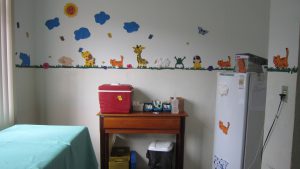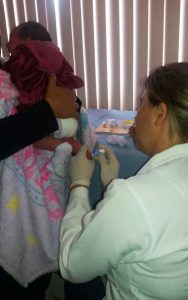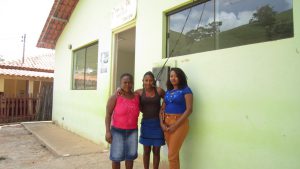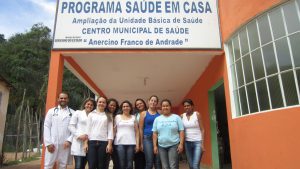
“It was a rainy, with lots of mud. I collected the neonatal heel prick test, sent it on the same day and on the next week, Nupad called warning about the alteration for hypothyroidism. The community health worker took the motorcycle, stopped halfway and walked the other half to call the parents to talk to me”, recalls the nurse Angélica Ramos regarding her first experience with the diagnosis for the neonatal screening, which happened in 2012. “The mother came on a horse cart, because that was no way of using a car. Nupad called on Wednesday and the appointment was on Thursday. The car was scheduled at the same time. The mother was a bit apprehensive, worried. On the next day, the child was in Belo Horizonte and started the treatment”, the nurse goes on. She is the responsible for the basic health unit Amigos da Saúde, in Durandé, a municipality in the southeastern part of the state of Minas Gerais. This recollection shows the reality of the municipality’s healthcare service that covers the rural area and serves about 8,000 inhabitants, and also reveals the importance of the health care network’s team.
Created in 2004 as the Family Health Program (PSF), Amigos da Saúde basic health unit is one of Durandé’s three units. It attends 830 families of six minicipality’s rural micro areas and has three places of operation: Durandé’s downtown and the settlements Igrejinha dos Vieiras and Dores do José Pedro. “There are all the services too, neonatal screening, immunization, toxoplasmosis tests, preventive tests, doctor, dentist, NASF team (Family Health Support Center)”, says Angélica about the settlement services. “The families are aware when the professionals will be there, so if they can’t wait, they come downtown”, she adds.
Neoneonatal screening indicators
According to Durandé’s Primary health care coordinator, Tereza Raquel Bassoto, Amigos da Saúde PSF conducts about 8 monthly neonatal heel prick test collections and, in the last 12 months, it did not send any sample considered inadequate for analysis according to Nupad. In addition, according to data from Nupad, the executing center of PTN-MG, under the management of SES-MG, the team stands out for the collection of the newborn’s blood in the correct term, that is between the 3rd and the 5th day of life, and forwarding the sample in filter paper to the laboratory timely.
To keep the good indicators, Angélica highlights the importance of the work of the team with the mothers-to-be. “It is due as much as to the nurse and nursing technician, as to the community health workers (ACS) who are there with the expectant mothers. We try to be friends with the patient, make her trust our job and learn the importance of taking the screening at the right time. We guide, we register the childbirth probable date to follow them up. When she comes for the collection, the child leaves with the pediatrician appointment already scheduled”, she explains.

The professionals also mention the new lancet used for the blood collection, which, according to them, contributed for the sample quality. “Before I thought it was more complicated with the other kind of lancet, after the change it is much easier”, says the nursing technician, Monique Fidélis. Monique, who was trained by Nupad in 2014 for the procedures of collection, storage and shipping of samples, has been part of the team for three years. Besides of her, all the other team members, nine professionals altogether, also took part of the training promoted by Nupad in Belo Horizonte
Diagnosis and care
Living in Dores do José Pedro, Ana Lúcia Rafael, 16 years old, is one of the young women followed up by PTN-MG from Amigos da Saúde PSF. She was diagnosed with Sickle Cell Disease right after her birth and started the treatment at Hemominas Foundation, in Belo Horizonte. “We left Dores and would go there each 30 days”, recollects the mother Obelina Maria, who also has five other children besides of Ana Lúcia. “She grew up and the trip became harder, I could transfer to Manhuaçu (blood center) and now the appointments are here, we come every year”, adds the housewife. The disease control is also conducted by the PSF medical doctor.
According to the mother, the daughter’s response to the treatment has always been positive: “She has never had crisis, never had pain, she is a beautiful and healthy girl”. Ana Lúcia adds: “I have a normal life; I study, go out with mom for fishing, watch TV and talk to my friends.”
Obelina tells that after the baby daughter Ana Lúcia’s diagnosis, the doctor oriented her to take the test to identify the presence of sickle cell disease in the whole family. The daughter Renilda, 21 years old, was also diagnosed.

Besides Ana Lúcia, other child taken care by Amigos da Saúde PSF and followed up by the Minas Gerais Neonatal Screening Program is Luziana Carlos, 4 years old, who was cited in the beginning. Nowadays, after the early diagnosis for congenital hypothyroidism, she has the disease under control with daily medication and frequent test taken in Durandé.
“When they mention the change in the heel prick test, I thought she was not going to walk, but thanks God we did the monitoring properly. She is a normal child, she has no sequela. She is all healthy, plays all day long, she is very intelligent, but quite naughty”, says Luziana’s mother, Ana Tereza de Oliveira. She, her husband and the daughter live in Córrego do Arrependido, another Durandé’s settlement. Each six months the come to the municipality’s health unit for the pediatrician appointment.
Ana Tereza explains that, in the beginning the daughter’s follow up was at the UBS once a year in an outpatient clinic in Belo Horizonte. After completing three years old, Luziana’s appointments were definitely transferred to Durandé. That contributed for the proximity between PSF team and the family and reduced the fatigue of the trips. “Now her blood is collected here, it is sent to Belo Horizonte, the result comes to Dr. Cecília (pediatrician), she analyzes and sends it back again”, summarizes the mother.
Everyone’s achievement
For the unit’s community health workers, the gains in primary health care at the municipality reflect the families’ trust. The families have been more and more complying with the health team’s recommendations, inside and out the UBS. “In the visits we advise them to take the neonatal heel prick test. The mothers know its importance”, says Carla Neves who has been in the groups for eight years. “I am very pleased with my job, people trust it”, adds Roberta Juliana.
The PSF general practitioner, Rodrigo Bertani, highlights the commitment of the professionals and the integration with the family for the good conduction of the neonatal screening and of any other healthcare services. “We worry about raising awareness in the users, let them know about the risks and the importance of keeping oneself healthy. The family is always present and works with us, integrated. The greatest beneficiary is the family and it is everyone’s achievement”, he says.

Durandé
According to the data of Durandé’s Primary Health Care Coordination, the municipality currently has 3 basic health units. All of them are registered in PTN-MG and the cover 100% of the town.
Durandé has 7,852 inhabitants and it is part of Manhumirim’s Regional Health Management (SES-MG data).


